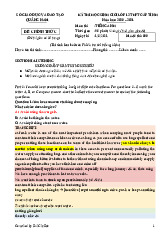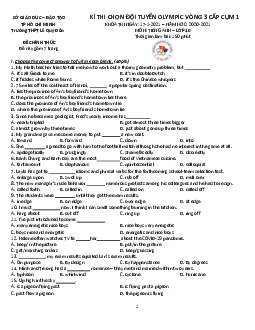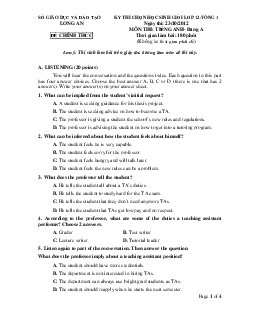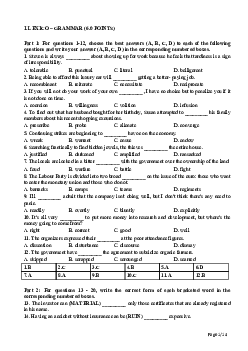












Preview text:
Guest - June 21, 2008 04:02 AM (GMT) ĐỀ THI HSG Quốc Gia
Trường học TTHPT Chuyên Bắc Giang Lớp học 12 Năm học 2005 Môn thi Anh văn Thời gian 180 phút Thang điểm 100
--------------------------------------------------------------------------------
I. LEXICO-GRAMMAR Part 1. Choose the word which best completes
each sentence. Write your answers in the space provided under this part.
1. Their eventual choice of the house was _____ by the time Peter would
take to get to the office. A. related B. dependent C. determined D. consequent
2. Her business must be going rather well, _____ by the car she drives. A.
deducing B. deciding C. inferring D. judging
3. My cousin obviously didn't _____ much of an impression on you if you
can't remember meeting her. A. create B. do C. make D. build
4. She was kept awake for most of the night by the _____ of a mosquito in
her ear. A. whine B. moan C. groan D. screech
5. If you would like to wait a moment, sir, I will just _____ your file on the
computer screen. A. call up B. pull down C. bring in D. pick up
6. He looks very aggressive and threatening, and so his soft, gentle voice is
rather _____. A. discordant B. disconcerting C. dismissive D. disembodied
7. If I were you, I would regard their offer with considerable _____, because
it seems too good to be true. A. suspicion B. doubt C. reservation D. disbelief
8. My sister's confidence in her ability to play the piano was badly _____ by
her last music teacher. A. subsided B. weakened C. undermined D. loosened
9. He got an excellent grade in his examination _____ the fact that he had
not worked particularly hard. A. because of B. although C. in spite of D. on account of
10. Your grandfather is rather tired so do not _____ your visit. Let him have
a rest. A prolong B lengthen C delay D shorten
11. Next month TV and cinema star Nicholas will be _____ as Aladdin at
the Apollo Theater. A. casting B. playing C. acting D. appearing
12. On leaving prison, Vic decided to turn over a new _____ and to give up
his old life of crime. A. book B. page C. chapter D. leaf
13. Most people buy their houses with a loan which they then pay back
_____ 25 years. A. over B. during C. with D. when
14. It was only _____ he told me his surname that I realized that we had
been to the same school. A. then B. until C. as soon as D. when
15. Now's a _____ time to tell me you're going out this evening. I've spent
the whole day preparing supper for you. A. suitable B. reasonable C. right D.
fine 1. _________ 4. _________ 7. _________ 10. _________ 13.
_________ 2. _________ 5. _________ 8. _________ 11. _________ 14.
_________ 3. _________ 6. _________ 9. _________ 12. _________ 15. _________
Part 2. Each line of the following passage contains one mistake (grammar or
spelling). Identify the mistake and write the correct form in the space
provided in the column on the right. (0) has been done as an example. All at
once it was night. The track was grass and even in daylight 0. grass - grassy
showed up hard at all against the moor, so it was difficult to keep on 1
_____________________ it now. If only I had been a smoker with match
always to hand, or if 2 _____________________ my torch had been in my
pocket insteads of in the suitcase, I could 3 _____________________ have
walked with more assurance. As it was, I was terrifying of 4
_____________________ hurling over the edge in the cliff to the rock
below. When I did stray, 5 _____________________ however, they was
towards the hills. I felt my feet squelching and 6 _____________________
sticking in something soggy. There was no bog to my knowledges 7
_____________________ near the track, so I must have wandered the long
way off my course. 8 _____________________ I extricated myself with
difficulty and very cautious edged myself 9 _____________________
towards the sound of the sea. Then I bumped in a little clump of 10
_____________________ trees that suddenly loomed up behind me.
Part 3. Write the correct form of each bracketed word in the space provided
in the column on the right. 1. The (ORIGIN) of the idea was that it had never
been offered before. _____________________ 2. He is very (ORGANIZE).
There is always a mess in his room. _____________________ 3. How are
you getting on with your (CORRESPOND) course in French?
_____________________ 4. It has become (INCREASE) difficult to find a
job nowadays. _____________________ 5. My previous boss was very
(SYMPATHY), he didn't understand _____________________ my situation.
6. Mary (ORDINARY) has lunch with her husband, but today he's _____________________ out of town on business.
7. Foreign language learning is (ARGUE) an issue that has attracted _____________________ a lot of attention
8. Vegetarianism gives children a sense of (INDIVIDUAL).
_____________________ 9. He's studying very hard and, not (SURPRISE),
he will have a _____________________ chance to go abroad.
10. It is important to realize that vegetarianism has more to do with
teenage (REBEL) than a real moral standard. _____________________
Part 4. Supply the correct form of the verbs in bracket. Write your answers
in the space provided under this passage. The Norwegian Government is
doing its best to keep the growth of the oil industry under control. A new
law (1) (limit) exploration to an area south of the southern end of the long
coastline; production limits (2) (lay) down; and oil companies (3) (not
allow) to employ more than a limited number of foreign workers. But the oil
industry (4) (have) a way of getting over such problems, and few people (5)
(believe) that the government (6) (be) able to hold things back for long. As
one Norwegian politician said last week: "We soon (7) (change) beyond all
recognition." Ever since the war, the Government (8) (carry out) a
programme of development in the area north of the Arctic Circle. During the
past few years this program (9) (have) a great deal of success: Tromso (10)
(build up) into a local capital with a university, a large hospital and a
wealthy industry. But the oil industry already (11) (start) (12) (draw) people
south, and within a few years the whole northern policy (13) (can be) in
ruins. The effects of development of the oil industry (14) (not limit) to the
north, however. With nearly 100 percent employment, everyone (15) (can
see) a situation developing in which the service industries and the tourist
industry will lose most of their workers to the oil industry. 1.
______________________ 6. ______________________ 11.
______________________ 2. ______________________ 7.
______________________ 12. ______________________ 3.
______________________ 8. ______________________ 13.
______________________ 4. ______________________ 9.
______________________ 14. ______________________ 5.
______________________ 10. ______________________ 15. ______________________
Part 5. Fill each blank with one suitable preposition. Write your answers in
the space provided under this passage. I had seen ghosts, and I was neither
frightened nor convinced that ghosts existed. I was about to get (1) out of
my chair and go to bed, when there came a sound (2) pattering in the hall, a
sound of bare feet coming (3) the polished floor, and every now and then, a
foot would slip, and I heard claws scratching (4) the wood as some four-
footed thing lost and regained its balance. I was not frightened, but uneasy.
The pattering came straight (5) the room that I was (6), then I heard the
sniffing of expectant nostrils; perhaps 'uneasy' was not the most suitable
word to describe my feelings then. Suddenly a herd of black creatures larger
than bloodhounds came galloping in; they had large pendulous ears, their
noses were to the ground sniffing; they went up (7) the lords and ladies of
long ago and fawned (8) them disgustingly, and ran (9) to great depths.
When I looked (10) them. I knew suddenly what these creatures were.
"Dogs, not ghosts." I burst out laughing. 1. _____________ 6.
_____________ 2. _____________ 7. _____________ 3. _____________ 8.
_____________ 4. _____________ 9. _____________ 5. _____________ 10. _____________
Part 6. Insert a(n), the, or Ø (article) where necessary. Write your answers in
the space provided under this passage. Christopher Columbus, an Italian,
was a sailor in Portugal. He yearned to find (1) new route to Asia and (2)
famed Spice Islands. He had (3) strong belief that he could reach (4) East by
sailing west around the world across the Atlantic Ocean. Stories of (5) pieces
of carved wood found drifting off (6) coast of Madeira and (7) Canary
islands never left his mind. The wood had apparently drifted across the
ocean from the west. He felt certain that he would find land if he headed (8)
west. Columbus sought financial support from the King and Queen of Spain
for his expedition. They gave him (9) money readily, hoping that he would
make Spain wealthy by finding gold and spices and (10) new trading
passage to Asia. 1. _____________ 6. _____________ 2. _____________ 7.
_____________ 3. _____________ 8. _____________ 4. _____________ 9.
_____________ 5. _____________ 10. _____________
II. READING Part 1. Read the text and circle the answer A, B, C, or D that
best fits each space. (0) has been done as an example. To the passer-by,
number 20 Grayleave, Fantasy, looks (0) like any other fairly old house in
Drugland. But (1) inside and you go back into a vanished world, (2) William
Straw's house is exactly as his parents left it when they died in the 1930s.
William Straw, who died in 1990, lived in the house with his brother Walter
after his parents' deaths. They lived (3) a strict routine, never married and
had no (4) friends. They had no social life and callers were never (5) into the
house. Their parents had a successful grocery shop and the family moved
into the house in 1923, immediately spending $170 - a huge (6) in those
days - on (7) redecoration. Their father died in 1932 and their mother in
1939, when William, then a history lecturer at Welldone University, returned
to Workshop. He (8) his job and set up house with Walter, who had been (9)
the shop since their father's death. (10), the two cut themselves off from the
rest of the world. Nothing that their parents had owned was ever moved or
(11) away. Towards the end of their lives, it seems that they became (12) of
the value of what they had done, because they began to put (13) on various
pictures and items of furniture, explaining where they (14) came from.
Today, the house is open to the public and visitors quickly (15) that it is the
closest they are ever likely to come to time travel. 0. A yet B still C just D
even 0. ___ C ___ 1. A step B stamp C tread D trip 1. _________ 2. A then
B for C from D so 2. _________ 3. A based on B according to C along with
D as from 3. _________ 4. A close B deep C familiar D warm 4. _________
5. A greeted B requested C invited D offered 5. _________ 6. A quantity B
wealth C fund D sum 6. _________ 7. A absolute B whole C throughout D
total 7. _________ 8. A gave up B finished off C ended with D got out 8.
_________ 9. A leading B commanding C running D conducting 9.
_________ 10. A Ever since B At the moment C From then on D That time
10. _________ 11. A removed B thrown C done D dismissed 11. _________
12. A clear B aware C thoughtful D wise 12. _________ 13. A certificates B
posters C messages D labels 13. _________ 14. A originally B at the earliest
C from the start D sooner 14. _________ 15. A catch B regard C distinguish D realize 15. _________
Part 2. Read the passage and choose the best answer for each question. Write
your answers in the spaces provided. The fertile valleys of the river Nile
straddle the hot desert land of Egypt. Rain is relatively scarce, and the
summers are scorching hot. Nevertheless the strip of land, known as the
Cultivation, on either side of the Nile is reputed to be one of the most fertile
places in the world. Its rich black soil is the result of accumulation of silt
deposited by the annual flooding of the Nile thousands of years ago. From
June to October, the river overflowed its banks. Modern damps were then
constructed to control the flooding. The floodwaters left behind a rich sticky
black mud which made it suitable for the cultivation of crops. As long as the
soil was well irrigated, two or three crops could be grown in one season. Its
rich soil led to the growth and rise of the brilliant civilization of the ancient
Egyptians on the Nile valley more than 5000 years ago. The earliest
Egyptians had acquired the skills to till the land along the banks, drawing
along the Nile became wealthy, they embarked on projects of digging
ditches and constructing dams to control the floods. In about 3100 BC, the
whole Egypt was united under the reign of King Menes. He and his
descendants made up Egypt's first ruling family, or dynasty. His rule led to
the great development of the arts like writing, painting, architecture, and
crafts. Egyptian power and influence were to last for the next 2000 years.
The Egyptian kings had absolute powers. The king possesses all the land,
and the peasants had to surrender part of their crops to the king. An army of
officials and scribes did the task of collecting the exact amount of due from
the individual farmers. Crops and livestock were often seen at the
storehouses surrounding the royal palaces. In return for their uphill task, the
king paid his officials and dishes out funds for huge irrigation projects.
Egypt's trade with the outside world stretches far and wide. In return for
gold, copper, gemstones, and building stones, it purchases the goods that it
did not have. Timber, resins, oils, silver and slaves came from Lebanon.
From Deria and Anatolia came horses, while the blue stone called lapis
lazuli was imported from Mesopotamia. Strong forts were constructed to
protect overland trade routes. Egypt held Nubia in the south for almost 800
years. It served as Egypt's most vital source of gold and slaves. 1. The
civilization of the ancient Egyptians was brought about by _____. A. the rich
alluvial soil of the Nile B. Egypt's first ruling family
C. the highly-developed writing, painting, architecture and crafts
D. Egypt's trade with the outside world
2. Egyptian slaves came from _____. A. Mesopotamia C. Lebanon B. Syria
and Anatolia D. Palestine 3. The king was wealthy because _____. A. huge
irrigation projects were set up C. he was in absolute power B. farmers paid
him their tribute D. he possessed all the land 4. The writer said that the
annual flooding of the Nile _____. A. helped to develop the arts C. needed
to be controlled B. caused an influx of foreign traders D. led to the discovery
of new mines 5. According to the passage, the king was wise _____. A. to
import the things that Egypt did not have C. to control the land B. to pay for
huge irrigation projects D. to own slaves and gold 6. In return for, in the first
line, last paragraph, refers to _____. A. the respect Egypt received C. the
protection the Egyptian army provided B. how fast the profit came D. what
Egypt exported 7. A suitable title for this passage is _____. A. The
Civilization Of The Ancient Egyptians C. The Might Of The Egyptian Army
B. The Farming Methods Of The Egyptians D. The Landscape Of the Egypt
8. We know the Egyptian Empire was powerful from the _____. A. way its
army fought with other invaders C. long period it extended its power and
influence B. trade and business done with other nations D. number of crops
grown in one season 9. Farm crops would be _____ if there was no water for
irrigation. A. harvested C. destroyed B. unprotected D. unavailable 10. From
June to October, the flood plains would be _____. A. inundated with
floodwaters from the Nile C. left to the sowing of new crops B. open to the
building of new dams D. raised to a higher level 1. _________ 3. _________
5. _________ 7. _________ 9. _________ 2. _________ 4. _________ 6.
_________ 8. _________ 10. _________
Part 3. Read the following leaflet and choose the most suitable heading from
the list A – I for each part of the leaflet.
There are three extra headings which you do not need to use. Write your
answers in the spaces provided. 0 has been done as an example.
A Treating you as an individual B Prompt response if you have any
problems C We're getting fewer complaints than ever before D No
organization has all the answers E If we don't have it, we'll make sure you
get it F Nobody wants to be kept hanging around G Professionals to deal
with you efficiently H More reliable self-service facilities I The idea behind this
0 - I We want to let you know what our services are and we want you to let
us know where you feel we're succeeding or falling short. We aim to serve
you better and we aim to meet high standards in terms of quick service,
machines, personal service, professional service, giving information, and dealing with complaints.
1 - ................... So, with the help of regular research, we have made it our
business to ask you, the customer, exactly what you want from your post
office. As you may have already noticed, there is now a poster which gives
you the latest information on wanting times at this post office. We also plan
to keep you up to date on our performance in other areas of activity. At the
back you'll find a reply paid card which we hope you'll use to let us have
your comments and ideas. The more we hear from you, the better we can
serve your needs. And for the 28 million of you who use your local post
office every week, that can only be good news.
2 - ................... Hardly surprisingly, then, we have set ourselves the key
target of reducing waiting times. Exactly how, though? We carried out
detailed surveys to establish when different post offices are busiest, so as to
provide the right level of staffing cover. In some post offices, for example,
there are very high peaks on Thursday mornings. In others, the greatest
demand may be at lunchtimes, or at the end of the month. To provide better
cover at busy times, many extra part-time staff have been recruited, allowing
us to schedule more flexibility. In some offices, extra serving positions are
provided to meet peak-time demand. Other initiatives include single queues,
special service positions and improved stamp vending machines.
3 - ................... For customers who simply want to buy a few stamps at their
local post office, vending machines can prove a great help. Recognizing
their speed of service and convenience, we have already invested $1.5
million in new style electronic vending machines that accept all US coins
and give change. Many post offices now have single stamp vending
machines internally as well as stamp book machines externally. We
regularly check customer requirements, and will continue to extend and
improve this network of vending machines wherever possible.
4 - ................... Like most other companies handling cash, we normally deal
with you from behind a glass screen, which can make it harder to provide
you with a personal service. We do our best, however, to overcome this
barrier by treating you with courtesy. All our staff are trained in customer
care; in fact independent research shows that in more than nine cases out of
ten, customers felt that our staff were 'friendly and approachable' and that,
even if we were unable to answer a question, they were willing to find
somebody who could. To make our service more personal, our staff will now
wear name badges so that you know exactly who you are dealing with. We
will also make sure we do the little things - like greeting you and thanking
you - that make you feel welcome and valued as a customer.
5 -................... Your local post office has more than 150 products and
services available to you. Some of these are straightforward, but others are
complex and require in each case different knowledge and expertise on the
part of our staff. What's more, nothing stands still. New product and service
information constantly need to be absorbed and kept up to date so that,
whenever you ask, your questions can be answered knowledgeably. The key
of course is training, to which we are fully committed. All our staff undergo
weekly training - and where possible we can hold these sessions outside
opening hours so that service to customers is not reduced.
Part 4. Fill each blank with one suitable word. Write your answers in the
space provided under this passage. Someone knocked on my door one night
when I was reading. I opened the door and (1) face to face with a strange
man. He was wearing a pair of black spectacles and a tuxedo which was
rather unusual, (2) in this warm climate. In his (3) he held a cane. It occurred
to me that I had seen this man before but could not recall (4) and where.
"Can I help you?" I asked him. The man did not answer, but (5) his crane in
the direction of the backyard. When I refused to let him enter, he took off his
spectacles and (6) at me. Held by a strange force, I could not move. He
wasted no time (7) walking straight to the backyard. As he passed me, I felt
a cold chill envelop (8). It was very strange. (9) before in my life had I
encountered a person with such power (10) me. A sudden impulse to scream
came over me, but no sound came out of my mouth when I tried to scream.
1. ___________ 3. ___________ 5. ___________ 7. ___________ 9.
___________ 2. ___________ 4. ___________ 6. ___________ 8. ___________ 10. ___________
III. WRITING Part 1. Finish the second sentence in each pair in such a way
that it means the same as the sentence before it. 1. You should make an
effort to get out and about more. It's high time 2. It seems as if there is a
slight deterioration in his physical condition. His physical condition 3. I
have forgotten that commentator's name but he's very well-known. That
commentator, 4. We can say that the leisure industry will be the money
spinner of the future. The leisure industry 5. It was overeating that caused his heart attack. If
Part 2. Write the second sentence in such a way that it is as similar as
possible in meaning to the original sentence. Use the word given in bracket
and other words as necessary. Do not change the form of the given word. 1.
The house has got everything except a large garden. (lacks)
2. I'm afraid to say that we haven't got any oil left. (up)
3. The film is similar to Shakespeare's Hamlet in a number of ways. (bears)
4. In all probability we will finish the project on Thursday. (chances)
5. The Embassy said it would not be necessary for me to get a visa. (need)
Task 3. Money cannot buy happiness, but lack of it can bring misery. Discuss the statement.
Give specific example(s) to support your point(s). (250 - 3 00 words)
_____________________________________________________________ __________________________
_____________________________________________________________ __________________________
_____________________________________________________________ __________________________
_____________________________________________________________ __________________________
_____________________________________________________________ __________________________
_____________________________________________________________ __________________________
_____________________________________________________________ __________________________
_____________________________________________________________ __________________________
_____________________________________________________________ __________________________
_____________________________________________________________ __________________________
_____________________________________________________________ __________________________
_____________________________________________________________ __________________________
_____________________________________________________________ __________________________
_____________________________________________________________ __________________________
_____________________________________________________________ __________________________
_____________________________________________________________ __________________________
_____________________________________________________________ __________________________
_____________________________________________________________ __________________________
_____________________________________________________________ __________________________
_____________________________________________________________ __________________________
_____________________________________________________________ __________________________
_____________________________________________________________ __________________________
_____________________________________________________________ __________________________
_____________________________________________________________ __________________________
_____________________________________________________________ __________________________
_____________________________________________________________ __________________________
_____________________________________________________________ __________________________
_____________________________________________________________ __________________________
_____________________________________________________________ __________________________
_____________________________________________________________ __________________________
Part 4. The chart shows average hours spent doing housework each week by
gender and marital status in Fancyland. Write a report of about 150 words
for your examiner(s) describing the information in the chart.
KEY TO NATIONAL ENGLISH EXAM 2005
I. LEXICO-GRAMMAR Part 1. Choose the word which best completes
each sentence. Write your answers in the space provided under this part. 1. C
2. D 3. C 4. D 5. A 6. C 7. C 8. C 9. C 10. A 11. D 12. D 13. A 14. D 15. A
Part 2. Each line of the following passage contains one mistake (grammar or
spelling). Identify the mistake and write the correct form in the space
provided in the column on the right. (0) has been done as an example. 1.
hardly 6. I was 2. only omitted 7. knowledge 3. instead 8. a long way 4.
terrified 9. cautiously 5. of the cliff 10. into a little ...
Part 3. Write the correct form of each bracketed word in the space provided
in the column on the right. 1. originality 6. ordinarily 2. disorganized 7.
arguably 3. correspondence 8. individualism 4. increasingly 9. surprisingly
5. unsympathetic 10. rebellion
Part 4. Supply the correct form of the verbs in bracket. Write your answers
in the space provided under this passage. 1. limits 6. will be 11. has already
started 2. have been laid 7. will soon change 12. to draw 3. are not allowed
8. has carried out 13. can be 4. has 9. has had 14. are not limited 5. believe 10. has built up 15. can see
Part 5. Fill each blank with one suitable preposition. Write your answers in
the space provided under this passage. 1. up 6. in 2. of 7. towards 3. on 8. on
4. on 9. 5. into 10. at Part 6. Insert a(n), the, or Ø (article) where necessary.
Write your answers in the space provided under this passage. 1. a 6. the 2.
the 7. the 3. Ø 8. Ø 4. the 9. the 5. the 10. a
II. READING Part 1. Read the text and circle the answer A, B, C, or D that
best fits each space. (0) has been done as an example. 0. just 1. A. step 6. D.
sum 11. B. thrown 2. B. for 7. D. total 12. B. aware 3. B. according to 8. A.
gave up 13. D. labels 4. A. close 9. C. running 14. A. originally 5. C. invited
10. C. From ... 15. D. realize
Part 2. Read the passage and choose the best answer for each question. Write
your answers in the spaces provided. 1. A 2. C 3. C 4. C 5. B 6. D 7. A 8. C 9. D 10. A
Part 3. Read the following leaflet and choose the most suitable heading from
the list A – I for each part of the leaflet. There are three extra headings
which you do not need to use. Write your answers in the spaces provided. 0 has been done as an example. 0. I 1. A 2. F 3. H 4. E 5. G
Part 4. Fill each blank with one suitable word. Write your answers in the
space provided under this passage. 1. stood/was 6. stared 2. especially 7. in
3. hand 8. myself 4. when 9. Never 5. pointed 10. over
III. WRITING Part 1. Finish the second sentence in each pair in such a way
that it means the same as the sentence before it. 1. It's high time you made an
effort to get out and about more. 2. His physical condition seems to be
deteriorating slightly. 3. That commentator, whose name I have forgotten, is
very well-known. 4. The leisure industry can be said to be the money
spinner of the future. 5. If it had not been for overeating he wouldn’t have
suffered from his heart attack.
Part 2. Write the second sentence in such a way that it is as similar as
possible in meaning to the original sentence. Use the word given in bracket
and other words as necessary. Do not change the form of the given word. 1.
The house lacks nothing but a large garden. 2. I’m afraid to say that we have
used up the oil. 3. The film bears a strong resemblance to Shakespeare’s
Hamlet. 4. The chances are that we will finish the project on Thursday. 5.
The Embassy said I didn’t need to bet a visa.
there was no need for me to get a visa.




